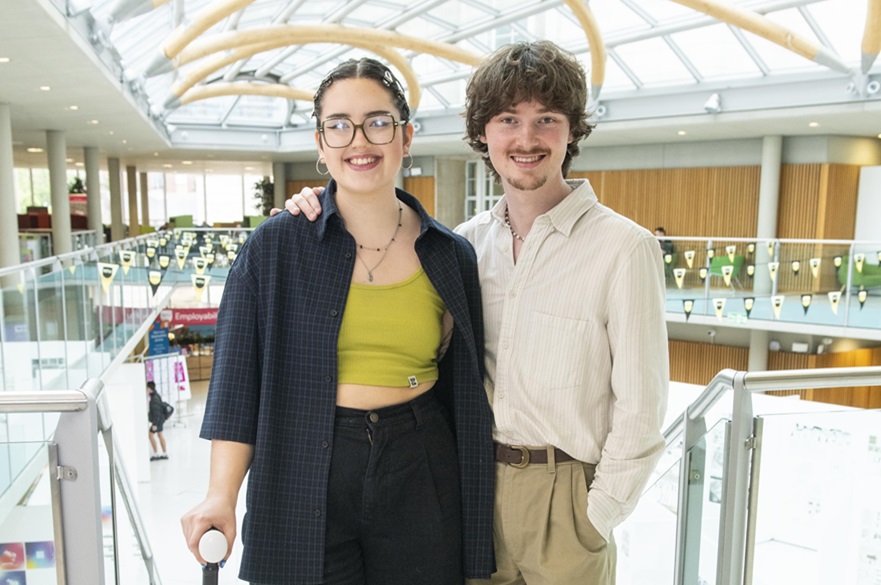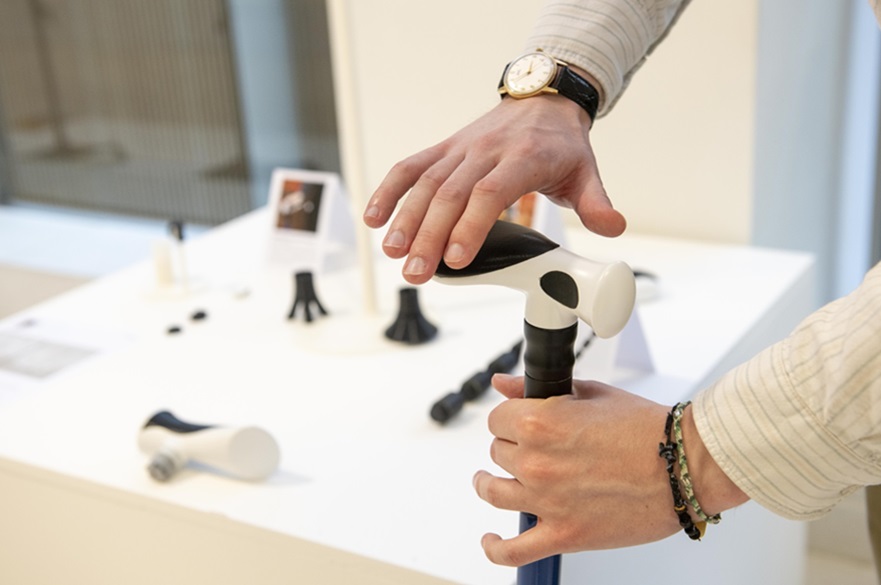Walking stick which could ‘change the lives’ of disabled people
Disabled people whose walking sticks regularly slide over while they’re paying at the till could soon have their lives improved thanks to a new design by a Nottingham Trent University (NTU) student.
By Chris Birkle | Published on 4 June 2024
Categories: Press office; School of Architecture, Design and the Built Environment;
Disabled people whose walking sticks regularly slide over while they’re paying at the till could soon have their lives improved thanks to a new design by a Nottingham Trent University (NTU) student.
Sean Guyett, 22, created the Ida walking stick which uses magnets to secure it to a person’s hip so they can use both their hands freely in everyday situations while out and about.
The BA Product Design student was inspired by his partner Ora Hambleton, 22, who has multiple sclerosis (MS), after witnessing first-hand the difficulties that disabled people face while trying to integrate walking sticks into their everyday lives.
Sean’s aim is to support all people who have a mobility disability, particularly those who are working-age disabled and those who find themselves ‘designed out’ of the wider world.
“For many disabled people, a walking stick is as essential as your wallet and keys,” said Sean, from Uxbridge in West London, who is studying in the School of Architecture, Design and the Built Environment.
“But unfortunately they don’t integrate very well into the rest of people’s lives, and in the urban environment a walking stick can become a real hinderance.
“While paying at a till, for example, walking sticks often slide onto the floor after being leant against a counter. When people are using the bus, they can also get in the way or be impossible to hold onto while standing.
“So I wanted to create something to show how we can design away many of the common problems that are faced by people who have to rely on a walking stick.”

Ora and Sean
Sean’s design centres on two neodymium magnet systems which allow for the walking stick to be attached to a person’s clothing.
The first system features a clip which hooks onto the top of a pair of trousers which a magnet in the walking stick is attracted to.
The second system is intended for clothing such as dresses and features a small steel plate which goes under the clothing. The magnet attaches to the plate from outside to hold it in place, and then the stick attaches to the magnet.
The walking stick can also be secured against any other metal surface and can be pulled away without difficulty.
There are three different designs of handles – each with a magnet inside – that are interchangeable and intended for different uses.
There are also three different bases available – known as ferrules – which are also interchangeable depending on the types of surfaces it will be needed for.
The pole is made from aluminum tubing which is lightweight, sturdy and available in a selection of colours to suit individual tastes.
It is named Ida after the mountain on which magnets were first discovered according to the Greek myth.
Sean was interested in helping people who are working-age disabled as Government figures show that almost half of people who have a disability are unemployed, compared to 18 per cent of able-bodied people.

Sean's design close-up
Ora, who is a postgraduate psychology student at NTU, said: “I often find that the standardised walking sticks you can buy don’t accommodate all of my needs.
“Especially when I’m out and about, trying to do things with only one hand, or leaving the stick propped against a counter can be a real annoyance.
“Sean’s design means that I don’t have to be worried about taking my stick out with me anymore because I know it will accommodate my needs in the moment.”
Sean’s design is on show for the Nottingham Trent University (NTU) Student Showcase at the City Campus until 7 June. The show is one of the UK’s largest public exhibitions of graduating design talent.
Principal Lecturer Max Pownall, who is course leader for BA Product Design in the School, said: “Sean has taken his partner’s personal experience of having a mobility disability to create something which could change the way that thousands of people use a walking stick.
“His simple yet ingenious design has the potential to give disabled people more personal confidence while they’re out and about by no longer having to worry about their walking stick falling over and drawing unnecessary and unwanted attention to them.
“Sean’s research has been very thorough and he has met with a range of disabled people who were kind enough to give him their time to allow him to have a greater understanding of their personal experience.
“This has all culminated in a product that is very well considered and could truly make a difference to disabled people around the world.”
Notes for Editors
Press enquiries please contact Chris Birkle, Public Relations Manager, on telephone +44 (0)115 848 2310, or via email.
Nottingham Trent University (NTU) received the Queen’s Anniversary Prize for Higher and Further Education in 2021 for cultural heritage science research. It is the second time that NTU has been bestowed the honour of receiving a Queen’s Anniversary Prize for its research, the first being in 2015 for leading-edge research on the safety and security of global citizens.
The Research Excellence Framework (2021) classed 83% of NTU’s research activity as either world-leading or internationally excellent. 86% of NTU’s research impact was assessed to be either world-leading or internationally excellent.
NTU was awarded The Times and The Sunday Times Modern University of the Year 2023 and ranked second best university in the UK in the Uni Compare Top 100 rankings (2021/2022). It was awarded Outstanding Support for Students 2020 (Times Higher Education Awards), University of the Year 2019 (Guardian University Awards, UK Social Mobility Awards), Modern University of the Year 2018 (Times and Sunday Times Good University Guide) and University of the Year 2017 (Times Higher Education Awards).
NTU is the 5th largest UK institution by student numbers, with approximately 40,000 students and more than 4,400 staff located across five campuses. It has an international student population of 7,000 and an NTU community representing over 160 countries.
Since 2000, NTU has invested £570 million in tools, technology, buildings and facilities.
NTU is in the UK’s top 10 for number of applications and ranked first for accepted offers (2021 UCAS UG acceptance data). It is also among the UK’s top five recruiters of students from disadvantaged backgrounds and was the first UK university to sign the Social Mobility Pledge.
NTU is ranked 2nd most sustainable university in the world in the 2022 UI Green Metric University World Rankings (out of more than 900 participating universities).